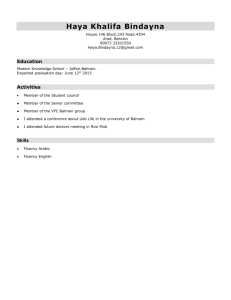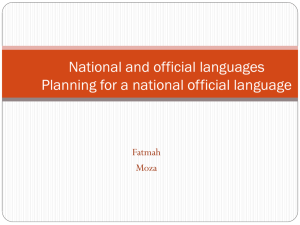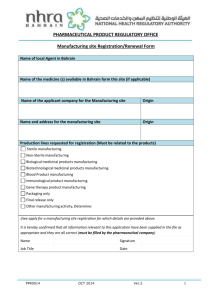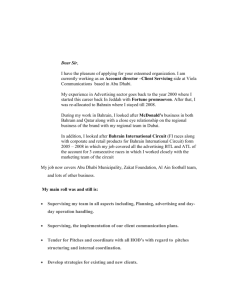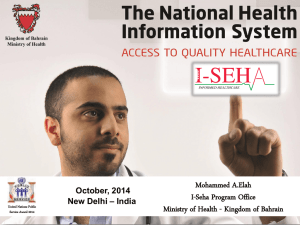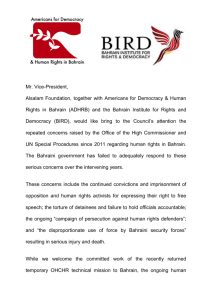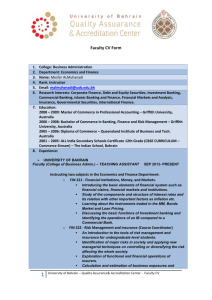Knocking the Door of Digital Heaven: What could Make them Open
advertisement
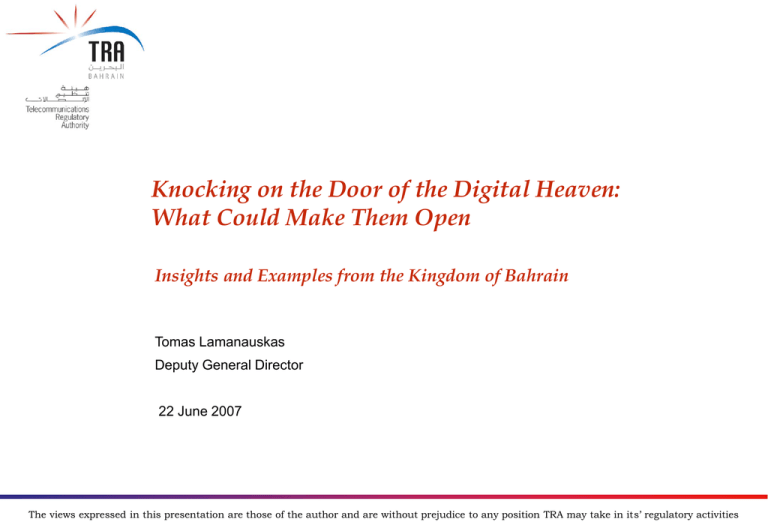
Knocking on the Door of the Digital Heaven: What Could Make Them Open Insights and Examples from the Kingdom of Bahrain Tomas Lamanauskas Deputy General Director 22 June 2007 The views expressed in this presentation are those of the author and are without prejudice to any position TRA may take in its’ regulatory activities Main elements… • What is going to be an enabler? – The Holy Grail – a Next Generation Network » A packet-based network, able to provide telecommunications services and able to make use of multiply broadband, QoSenabled transport technologies and in which service-related functions are independent from underlying transport-related technologies » It enables unfettered access for users to networks and to competing service providers and/or services of their choice – To what extent it is possible? • What is enabled? – Transport independent services with global reach? – More sophisticated services from the same old provider? 2 Infrastructure - What is important?.. • International connectivity – Essential for global high-bandwidth-demanding services – How to encourage competitive choice? » How to break a “chicken or egg” dilemma? » What comes first – demand or supply? – How to ensure the adequate capacity and appropriate prices? » What is the right approach for small developing countries? • Backbone/backhaul – Incumbent’s fiber networks » Including wholesale services – Alternative networks » Fiber – Ability to construct and/or share ducts » Other technologies – microwaves? – Free Space Optics? 3 Infrastructure – What is important?.. • Access: – Wire-based over incumbent’s networks: » Incumbent’s DSL – Including resale » Bitstream based » Based on unbundled local loop – Alternative wire-based » FTTx – Independent networks - Mainly business oriented – Integral part of property developers’ business model – selling point for residential and business facilities -Networks operated by telecoms operators -Operator neutral networks » Cable-TV networks – Not in Bahrain 4 Infrastructure – What is important?.. • Access: – Wireless » Free Space Optics – Used to connect business customers » WiFi muni-type networks – Roll-out of free privately driven access for residential users in Bahrain » 3G/3.5G – Bahrain is fully covered » WiMAX – 2 operators launching their services in Bahrain this autumn » Sattelite – Main network for multi-channel television in Bahrain » New generation broadcasting networks – Digital terrestrial television – Digital mobile/handheld television 5 Content provision… “Walled gardens” or Open space”? • Possible benefits of the “walled gardens” : – Lower prices for access services because of the subsidies from content » Introduction of new technologies in a more affordable way – Possibilities for better quality of service control – Some services should still be provided “close to the edge” because of technological/bandwidth considerations » Esp., IPTV – “One stop shopping” and integrated billing » Less confusion for consumer – Trusted relationship between access provider and user » Important with regard to payment for services – Some users could want space not to be so open » Social-cultural-moral considerations, together with… – Every society has its own values – One size does not necessarily fit all » … Lack of user confidence in their ability to protect themselves – Protection of minors issue – Extra-jurisdictional issues ≫Real life example – Jordan Kiosk Edufun by Jordan Telecom Image: www.gapingvoid.com 6 Content provision… “Walled gardens” or “Open space”? • Restrictions of the “walled gardens” – Less choice of services and their providers – Risk for small countries (in particular with low penetration) to be left behind » High entrance costs for global application providers in comparison with possible benefits » Burdensome administration » Weak bargaining power of local operators » Integration into regional or global co-operation frameworks could be vital – Barriers for small service/content providers to reach global customer base » One of the basic benefits of the Internet undermined 7 Content provision… “Walled gardens” or “Open space”? • Why “open space”?: – “Global village” - ability to reach global content » Global knowledge base – Mainly work related » Global social networks (“user generated” media) – The most searched words at Google in 2006 (BBC): -Bebo -MySpace -World Cup -Metacafe -Radioblog -Wikipedia -Video -Rebelde -Mininova -Wiki 8 Content provision… “Walled gardens” or “Open space”? • Why “Open space”?: – “My own old good hamlet wherever I go” » 38% of Bahrain population – expatriates – Still part of their nations - nation "is imagined [community] because the members of even the smallest nation will never know most of their fellow-members, meet them, or even hear of them, yet in the minds of each lives the image of their communion" (Andersen, B.) - created by “print-capitalism” and being kept together by “death of distance” in the “information age” » What kind of content they are interested in (anecdotal evidence): – Home country/town news – Home country/town radio stations – Home sports club – Home bank – Blogs of politicians back home – ….. » Modes of usage – real time/time shift 9 Content provision… “Walled gardens” or “Open space”? • Downsides of the “open space”: – No possibilities to cross-subsidize between access/network and content services » Could mean more expensive access » No “free” broadband? – More difficult to control the quality of services » Importance of this factor is diminishing with the development of technologies – More choice also increase confusion for a customer » Need for an educated user 10 “Walled gardens” v. “Open space” – what is the answer? • So – which model should regulators prefer – Unlock the “walled gardens” and ensure “network neutrality”? – Let operators earn money from content provision? – Or maybe… - Let the market decide… » Promote competition and tackle market failures in a usual way – Creativity should be encouraged and not punished, but… – Real market failures should be remedied » “Walled gardens” could be a good initial strategy – Esp., for novice users, who could get cheaper access, more protection and less confusion – Could assist in building a business case for “open space” strategy - Users would know, why they are paying money for the access… OR » Operators themselves start opening the “walled gardens” as a way to gain a competitive advantage – Content market is much smaller than the transport one – “User generated” media increases traffic needs, but decreases need for a premium content » Long-term anti-competitive market closure should be avoided » Is the issue new? – Cross subsidy between services and hand-sets led the growth in mobile market making it the most successful electronic communication market – Just a few other examples: 11 Some regulatory insights… • Overarching approach – promoting competitive outcomes – Coherent regulation of converging infrastructures » Technological neutrality – Barriers to entry to be eliminated » Bahrain telecommunications market is fully liberalised » In Bahrain – comprehensive review of telecommunications licensing framework underway – Creativity to be promoted – Market failures to be remedied » Regulators could need new powers to tackle competition issues, spanning over transport and content • Specific approaches on the infrastructure side: – Promoting adequate international connectivity » Supporting private initiatives aimed at achieving provision of alternative links » Promotion of demand aggregation (e.g., National/Regional Internet Exchanges) – Enabling operators to build wire-based networks (esp., backbone/backhaul) » Access to public property, esp. road-corridors » Duct sharing » Promoting access to ducts and corridors of other utilities 12 Some regulatory insights… • Specific approaches on the infrastructure side (cont’d): – Access to inputs, administered by the state, in particular radio spectrum: » Bahrain recently implemented light-licensing for WiFi, licensed WiMAX spectrum, comprehensive reform of radio spectrum management with a view to lower barriers to spectrum is under way – Adequate access to the bottlenecks, operated by incumbent: » Wholesale DSL » Bitstream » Local loop unbundling – Clear policy regarding the infrastructure deployment in the new property developments » In particular important in such countries as Bahrain, with extremely rapid “green-field” urban development 13 Some regulatory insights… • Specific approaches on the services/content side: – Clear framework for representation of public interests, representing cultural, moral, religious values of the society » Different from the economical-technical regulation – Separation or integration of these issues into overarching ICT regulation – region/country specific solution should be adopted » Taking into account changing trends of media consumption » Understanding differences between regions/countries » Taking into account interests of economic development » Represented via clear, open and transparent policies as well as legislative and regulatory frameworks – Adequate legal and regulatory framework for payments – Promotion of adequate intellectual property licensing arrangements » Smaller countries risk being secluded if agreed on country-bycountry basis only » Adequate systems of royalties 14 Some regulatory insights… • Specific approaches on services/content side (cont’d): – Pragmatic approach to jurisdiction » TRA Bahrain’s Position Paper on Regulation of VoIP services (05/2007): – “…TRA would not consider telecommunications service providers covered by its jurisdiction (and therefore obliged to be licensed according to the Law and comply with the relevant obligations) only because their services could be accessed by the residents of the Kingdom of Bahrain utilising the Internet services. However TRA would consider that the Law applies to all the service providers irrespective of the place of their establishment and location of their technical equipment who effectively, deliberately, and purposefully direct their activities to residents of the Kingdom of Bahrain.” – “The positions outlined above do not preclude TRA or any other public authority of the Kingdom of Bahrain from taking necessary steps to restrict access to services materially infringing the laws of the Kingdom of Bahrain.” – Ensuring adequate level of consumer protection » Appropriate national frameworks should be in place – Customer protection framework (economic rights) – Privacy and data protection – Cyber-security » National level is not sufficient – Arab Regulators Network established a Working Group on Consumer Protection 15 Thank you… Tomas Lamanauskas Deputy General Director Telecommunications Regulatory Authority Kingdom of Bahrain Tel: +973 1752 0000, Fax: +973 1753 2125 e-mail: tlamanauskas@tra.org.bh https://www.tra.org.bh 16
